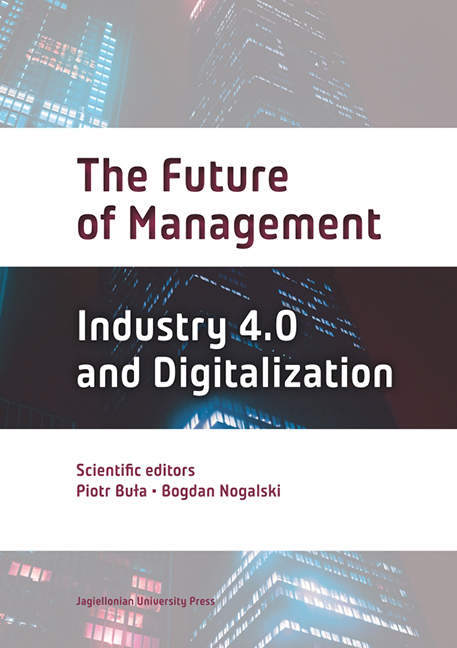Book contents
- Frontmatter
- Contents
- Preface
- Industry 4.0: Social Impacts and Operations Management Challenges
- Business Model Changes in the Presence of Challenges Brought by Industry 4.0
- Communication in Traditional and Network Organisation: Transformation
- Consequences of the Fourth Industrial Revolution in Social and Economic Development in the 21st Century
- Ideology, Trust, and Spirituality: A Framework for Management Control Research in the Era of Industry 4.0
- Renewable Energy through Industry 4.0 on the Example of Photovoltaic Development in Selected European Countries
- Employee Loyalty in the ICT Sector as a Challenge for Building Industry 4.0
- The Importance of Flexibility of Human, Tangible and Intangible Resources in Selected Production Entrepreneurships: Results of Empirical Research
- Challenges Posed for Universities by the Industry 4.0 Environment
- Big Data in Managing Marketing Communication
- Mathematical Risk Assessment Method in the Implementation of Logistic Processes
- Management and Digitisation
- Branding of Time as a New Direction in Tomorrow’s Management
- The Future of Branding
Challenges Posed for Universities by the Industry 4.0 Environment
Published online by Cambridge University Press: 16 November 2021
- Frontmatter
- Contents
- Preface
- Industry 4.0: Social Impacts and Operations Management Challenges
- Business Model Changes in the Presence of Challenges Brought by Industry 4.0
- Communication in Traditional and Network Organisation: Transformation
- Consequences of the Fourth Industrial Revolution in Social and Economic Development in the 21st Century
- Ideology, Trust, and Spirituality: A Framework for Management Control Research in the Era of Industry 4.0
- Renewable Energy through Industry 4.0 on the Example of Photovoltaic Development in Selected European Countries
- Employee Loyalty in the ICT Sector as a Challenge for Building Industry 4.0
- The Importance of Flexibility of Human, Tangible and Intangible Resources in Selected Production Entrepreneurships: Results of Empirical Research
- Challenges Posed for Universities by the Industry 4.0 Environment
- Big Data in Managing Marketing Communication
- Mathematical Risk Assessment Method in the Implementation of Logistic Processes
- Management and Digitisation
- Branding of Time as a New Direction in Tomorrow’s Management
- The Future of Branding
Summary
We must … deal quickly with the fusion of the online world and the
world of industrial production. In Germany, we call it Industrie 4.0
Angela Merkel, German ChancellorWe stand on the brink of a technological revolution that will fundamentally alter the way we live, work, and relate to one another … unlike anything humankind has experienced before.
Klaus Schwab, Founder and Executive Chairman of the World Economic ForumAbstract
Industry 4.0, a term that describes the Fourth Industrial Revolution, will reshape our lives by the common use of robots. Machines will communicate with each other (Internet of Things). Those changes will alter the socio-economic environment we live in nowadays. Many jobs will disappear. The main issue that stands before universities is to predict which skills should be taught to fulfil the future job market requirements.
Keywords: Industry 4.0, education, skills in industry 4.0, educational industry, future labor market Requirements
Introduction
The term “Industry 4.0” (or the original German: “Industrie 4.0”) is currently a top priority for everybody, from business representatives, through researchers, to university leaders. There is no widely accepted definition of the term. That is why the scientific debate must be continued on a global scale, as the revolution changes peoples’ lives everywhere in ever so many dimensions.
Revolutions of the world industry
The term “Industry 4.0” was firstl publicly introduced in 2011 as “Industrie 4.0” (in German) by a group of representatives from different fields, such as business people, politicians and representatives of higher education institutions. The term was an initiative to enhance the competitiveness of the German industry. The idea appeared to be so important that it became the leading theme of the High-Tech Strategy 2020 introduced by the German federal government.
The earlier stages of the “revolutions” in industrial development dated back to the 18th century, or more precisely, to the years 1760–1840 when the introduction and wide use of machines in the industry occurred. For the first time in human history, powered by steam, machines were responsible for the shift from manual production.
The Second Industrial Revolution, between 1870 and 1914, was connected with the introduction of such systems as the telegraph and railroads.
- Type
- Chapter
- Information
- The Future of ManagementVolume Two: Industry 4.0 and Digitalization, pp. 141 - 148Publisher: Jagiellonian University PressPrint publication year: 2022

